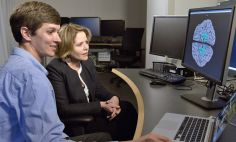Renée Fleming is one of the most acclaimed singers of our time. She’s thrilled audiences around the world in concert halls, opera houses, movies, and on Broadway.
Now she is working with NIH, the John F. Kennedy Center for the Performing Arts (in association with the National Endowment for the Arts) on the Sound Health initiative. This initiative is a new effort to better understand the connection between music and the brain and to improve health and wellness through music. Fleming spoke with NIH MedlinePlus about Sound Health.
Tell us about meeting NIH Director Francis Collins, M.D., Ph.D., and the role it played in getting all this started.
A small group of extraordinary people were having dinner, including several justices of the U.S. Supreme Court. And it just so happened it was the evening after several very divided court decisions were announced. The atmosphere was a bit tense. But music changed that. Dr. Collins had brought his guitar. It turned out to be quite a sing-along.
Singing changed everyone’s moods and the atmosphere into a fun, delightful evening. It was a magical experience, which reinforced the power that music has over us. At that dinner the idea for Sound Health was hatched.
Dr. Collins and I started talking about my fascination with recent studies published about the power of music and the brain. I had just taken an advisory position with John F. Kennedy Center for the Performing Arts and suggested that maybe NIH could collaborate with the Kennedy Center to expand what we know about music and health. He enthusiastically agreed, and we have been working together ever since.
What drives your interest in this research?
I feel strongly that the arts have a great deal to offer for improving health and wellness.
For singers, our instrument is internal and very challenging to control. That’s because it is mostly run by involuntary muscles. You’d be amazed at what we have to do to produce a classically trained voice (without the aid of microphones) in a large space like an opera house. My interest is driven by that and my thinking about the psychological aspects of performance pressure.
I am learning something new every day that I’m involved with this fascinating work.
You underwent an MRI at NIH to add to the research on music and health. Can you tell us about that and what you learned?
Yes. I don’t think I quite knew what I had signed up for! I didn’t realize I would be in the machine for two hours. Both the scientists and I were surprised that the MRI showed my brain was most active when I imagined myself singing. More than even when I actually spoke or sang!
What are your dreams about what Sound Health could lead to?
My initial dream had to do with advocating for music in the arts through science. In every city I perform I invite researchers, scientists, and music therapists to present and lead discussions. The audiences are fascinated by these discussions.
I would also like to create a way to bring the disciplines of music and science together. It is happening. Recently we brought music therapists to NIH for the first time to meet with scientists and researchers.
Ultimately I hope that we’ll improve the health and well-being of people. One practical example is that it would be great if music therapy was more widely available to help people.
I saw a video of a man who had a stroke learn to speak again in just two minutes with the help of a music therapist. I wondered how many people have suffered and not regained their speech because they didn’t know about or have access to music therapy.
Do you have a message for our readers about what they can do in their own lives to further the goals of Sound Health?
Play an instrument, join a choir. Making music together is a great way to create community, not through technology, but face to face. It is also great for brain health and vibrancy.
How has Sound Health changed your understanding of the work that NIH does?
Lots of people don’t know what NIH is and what it does. I had no idea how broad a reach NIH has and that it is the largest funder of medical research in the world. We have made great strides in medicine because of the work that NIH has done and is doing. I love that NIH sees its work in terms of how we can make life better and improve the quality of our lives.







